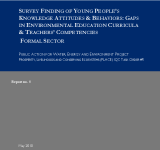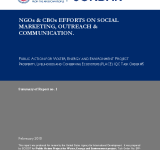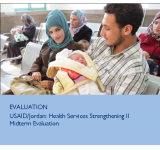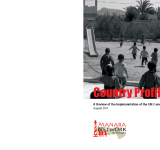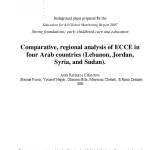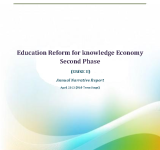The report aims to learn about young people's knowledge;; attitudes;; and behaviors with regards to water conservation;; energy conservation;; and waste management;; and it assess these against the learning objectives of the curriculum. It discovers that students' knowledge was sufficient and at times more sophisticated than that founded in the curriculum even though their attitudes and behaviors remain largely unchanged. The object of the survey pertains to the objectives of the Public Action for Water;; Energy;; and Environment Project;; which revolve around education for young people;; teachers and youth leaders to develop their knowledge and ethical values and attitudes. The survey focuses on assessing young people and educator's current awareness of water and energy resources and waste reduction and evaluating formal curriculum resources. The report points at the gap of translating young people's knowledge into genuine interest;; concern and action and proposes set of targeted actions including development of relevant resources and additional supplemental materials;; age-relevant projects to support environmental concepts in the national curriculum and assignment of environmental coordinator at all schools.
USAID
The report is based on the findings of the survey that was designed to review NGO/CBO experience in communication/outreach and assess the capability of individual staff in the relevant NGOS and CBOs. The primary goal of the project is to institutionalize social marketing practices in NGOs and CBOs;; because organizations in the forefront of development depend on their ability to reach target groups and remove barriers to change. The research was conducted as part of the Public Action in Water;; Energy;; and Environmental Project to initiate and establish clear and identifiable behavioral changes amongst the Jordanian public and decision-makers;; to lead to increased efficiency in the use of water and energy;; and to improve solid waste handling practices. The main findings of the research identify sources of funds and grants of the NGOs;; their major activities and partnerships. The report also suggests training for successful fundraising;; social marketing and media campaigns for the NGOs and continued surveys and interviews of the NGOs.
The report presents the findings;; conclusions and recommendations of a midterm evaluation of Health Systems Strengthening (HSS) II;; a five year (2009-2014);; $73 million USAID-funded project. The strategy of the HSS II is to institutionalize strengthened health systems in support of reduced fertility rates and improved women's health. It works with the public health sector;; namely the Ministry of Health;; the Royal Medical Service and the Jordan University Hospital. The report finds that the project has met 13 of its 23 targets for year 3 and is on track to meet all its objectives by the end of the project. Expected results are public sector initiatives in safe motherhood and reproductive health. The HSS II project;; with its close ties with the Ministry of Health for its responsiveness to health needs and integrated approach to health delivery;; has strengthened critical health systems through its support to health management information system;; renovations;; accreditation;; referrals and capacity-building. The report recommends the USAID to negotiate the removal of a requirement that midwives be supervised intrauterine device insertion;; advocate for innovative incentive schemes and varying salary grades that reward midwives and doctors providing FP services and revise project indicators to reflect health outcomes and impact. Further recommendations include continuing support of a broad-scale mass media behavior change and communication campaign and programs that build on gains in maternal and neonatal health.
The country profile component of the Manara project is a rigorous and exhaustive report on the status of the implementation of the Convention on the Rights of the Child. It aims to be a resource for identifying gaps and challenges on the status of the implementation of the Convention;; to highlight the recommendations of the Committee on the Rights of the Child on specific matters;; and to identify commendable practices implemented by the State;; civil society and the international community in addressing these issues. The information was collected by exhaustive literature review and followed by field research involving a series of interviews with identified stakeholders;; government ministries and institutions;; local and INGOs;; academics;; unions and professional associations;; media;; religious authorities and United Nations agencies were contacted and interviewed. The structure of the study is based on the following themes: human rights;; children’s rights;; child labor and violence against children
This report provides an overview of the status of early childhood care and education (ECCE) in Jordan;; Lebanon;; Sudan;; and Syria. It examines the contextual factors influencing ECCE;; highlighting current policies;; challenges;; and strategies for improvement and expansion. The report underscores the paucity and limitations of available data. Findings show that ECCE services have improved but regional disparity and dominance of the private sector prevail. None of the four countries but Jordan has a full-fledged national strategy and policy on ECCE. Challenges identified include lack of qualified teachers;; societal misconceptions about the unique features of early childhood;; and lack of research-based studies. Innovative projects show that NGOs have been instrumental in addressing the needs of marginalized children.
The second phase of the Program Education Reform for the Knowledge Economy Program (ERfKE II) continues to build on the achievements of the first phase and follow the same implementation arrangements that have proven to be successful in (ERfKE I);; and in the same time;; focuses on schools as the locus of change as well as on the need to enhance capacity building at the central and field levels. The development objective of (ERfKE II) is to provide students enrolled in pre-tertiary education institutions in Jordan with increased levels of skills to participate in knowledge economy. Also the Mid-Term review highlighted the concrete progress achieved by (ERfKE II) in several key areas related to policy development;; quality of education interventions and school construction;; and identified the key issues as a summary of the overall progress that will be tackled and addressed during the remaining stage of implementation.
